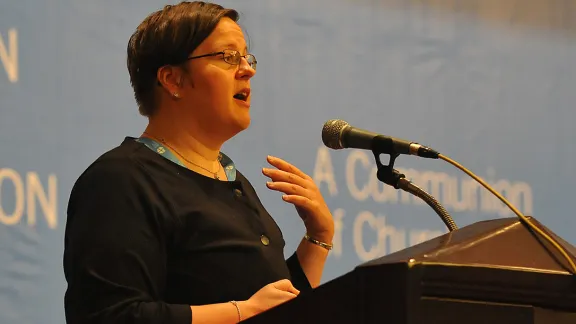
Dr Minna Hietamaki presents the First Report of the Working Group on the Self-Understanding of the Lutheran Communion to Council 2014. Photo: LWF/M. Renaux
Council Receives Study Outline on Self-Understanding of the Lutheran Communion
(LWI) – A working group on the self-understanding of belonging to The Lutheran World Federation (LWF) has encouraged LWF member churches to see communion as a gift “we have already received,” and as a task that calls the respective members to discern together their mutual accountability towards each other.
In its preliminary report to the LWF Council meeting in Medan, Indonesia, the newly appointed working group on the Self-Understanding of the Lutheran Communion shared reflections from its first meeting in March. The report maps out a study process that will discuss the understanding of church fellowship within the LWF; the shared gift of participating in the Gospel of Jesus Christ; and the task of accountability for churches that are both autonomous and in communion with each other.
The seven-person group comprises theologians representing the LWF members and accompanying staff persons. Its final draft report will be discussed at the June 2015 Council meeting, and subsequently shared with the member churches. LWF constitutional provisions and relevant theological documents will inform the drafting process, which will include individual and virtual meetings, as well as input from the various leadership gatherings in the LWF regions during 2014 and 2015.
At its June 2013 meeting, the Council asked the General Secretary “to engage member churches in further theological reflections on how to respect the autonomy of LWF member churches’ decisions and express and deal with the resulting differences, while at the same time upholding their commitment to live and work together as a communion of churches.”
The working group’s preliminary report noted that while previous studies have explored the Christological, ecclesiological and spiritual dimensions of the LWF as a communion, the process of expressing the communion fully in the life and internal relationships between the member churches remains an on-going task.
Reconciled Diversity and Accountability
Referring to LWF General Secretary Martin Junge’s address at the group’s inaugural meeting, the report noted that the concept of reconciled diversity is an additional building block to which the Lutheran communion can particularly relate and offer as a possible process of expressing disagreement.
Churches of the LWF communion do not see themselves as an association of like-minded individuals “but as a deep fellowship of a variety of churches of the Lutheran confessional tradition seeking common witness to the world,” the group reported. It added that this “diversity is not on the way towards uniformity but rests in the reality of recognition and reconciliation of differences that bring both joy and challenge to the communion.”
The task of being in communion does not contrast autonomy against accountability, but instead calls on churches to exercise their freedom to serve while being accountable to the gospel and to the individual church membership context.
Each church is therefore “differently accountable” to contextual and catholic realities, which are in a dynamic relationship. As accountability is also about how the church seeks to be apostolic—accountable to the gospel, Scriptures, history and tradition—the working group suggested a new way of discussing the distinction between autonomy and accountability by speaking about “‘accountability to context/accountability to catholicity.’”
The study process will also name challenges in the communion. The working group reported that diversity as both an individual church and communion-wide characteristic poses questions on how to create common orientation for churches that have different decision-making mechanisms.
The preliminary report noted that diversified accountability creates challenges when member churches identify differences as intolerable. The question then remains, “When does it become impossible for churches within the communion to recognize each other as churches of Christ and what are the consequences?”
Lessons Learned
Still, lessons can be learned from concrete examples with the communion and other Christian World Communions, the group reported. “We want to offer examples of deepened, lived communion where the local and global exist in fruitful relationship.”
The section on forms of fellowship will explore the variety of mechanisms that are available for learning to be a communion together. This will include issues relating to the use and abuse of power in the different contexts, while taking into account gender, economic realities and decision-making, among other dynamics.
Joint accountability was highlighted as an important part of the discernment process for a communion that is on a shared journey in different contexts. The group members said they would “emphasize listening to the quieted voices, those who have stayed in the margins or have been silenced.”
The study document will offer suggestions on how to nourish trust, encourage but also admonish each other, with the aim “to confirm our commitment to each other and to the gift of communion we have already received,” the working group concluded.
Council 2014 News | Council 2014 Blog | Council 2014 Documents | Council 2014 Photos


